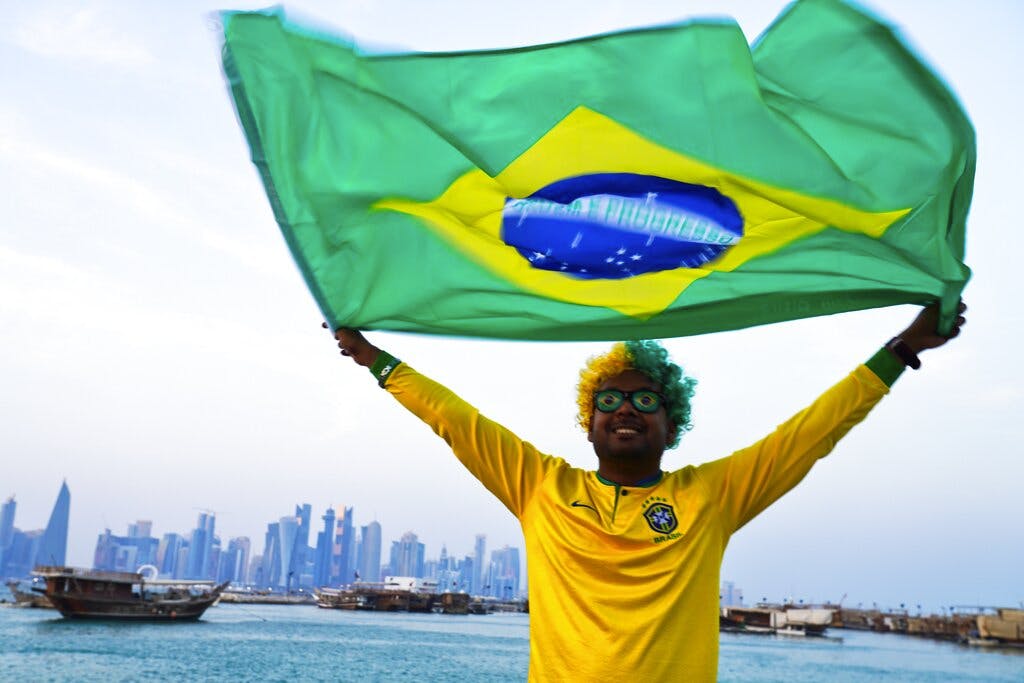As Long as You’re Not in Qatar, Grab a Beer and Watch the World Cup
FIFA bows to the host nation and bans alcohol just two days before the huge soccer tournament’s opening match. Here’s what to watch for — on the pitch and off.

Two days before the opening match of the World Cup, soccer’s governing body, FIFA, is surrendering once more to the host country, Qatar: Alcohol is now Haram — Arabic for verboten — at the stadiums.
The ban reverses a prior decision to allow drinking, albeit only in enclosures akin to smokers’ cages at airports. Fans are mostly angry about the ever-changing rules, meant to accommodate the sensibility of the Islamic host.
Qatar, sporting less-than-stellar soccer credentials, has allegedly won the hosting privilege through influence peddling and bribery. The timing of the matches has disrupted Europe’s professional league play; the tournament is normally played in the summer, but was moved due to Qatar’s hot climate. This week’s temperatures are in the mid-80s.
There will be many things to keep an eye on during the tournament.
Protests
FIFA bigwigs have begged all involved to concentrate on the “beautiful game,” and to ignore politics. Their plea will fall on deaf ears. Much protest is anticipated, starting with highlighting work conditions for foreign laborers, some 6,500 of whom died in building the stadiums.
Qatar, like other Gulf states, is trying to gain world influence by importing human assets — from highly paid scientists, doctors, and artists to a cheap work force from poorer countries, employed in near-slavery conditions. Expect some visitors, and perhaps even players, to make noise about it. Climate protesters may also highlight the carbon-emitting air-conditioning machines in the open-air stadiums.
Other likely protests may center on Qatar’s strict social laws. The captain of Team England, Harry Kane, is reportedly planning to wear a “one love” armband in defiance of the strict local anti-LGBT laws. Several other European captains may join him, risking FIFA fines.
The most anticipated protest involves Team Iran. Players so far have declined to say whether they would show solidarity with fellow Iranians revolting against the Islamic Republic regime. In all likelihood, they and their families are under strict watch, facing serious threats. Any sign that brave players stand with the rebels in defiance of that danger could mark a turning point in the anti-mullah revolution.
Security
Like most everything else in Qatar, the more than 50,000-strong force looking to guarantee safety at the matches is mostly imported. Police forces from around the world and private contractors have pledged their expertise. Qatar’s ally Turkey sent in 3,000 riot-control cops and other assets, including bomb-sniffing dogs and trainers. Pakistani military troops have arrived as well. France, Britain, Jordan, and others also send small contingencies to assure everything goes smoothly.
U-S-A, U-S-A
Although the focus of all of that security is the more than one million visitors in a small country and enemies of Qatar, another issue needs attention: Qatar hosts, at Al Udaid, the largest American military base in the Mideast, which could turn into a major target for would-be trouble makers. While officially Qatar is charged with securing the airbase, America, hopefully, will also take care of its own.
Secretary Blinken will land at Doha Monday for talks with his Qatari counterpart, and perhaps watch America’s first match. Team USA, no longer a soccer slouch, is the world’s 15th best squad, according to FIFA ranking. It will first face Wales, followed by a game against England.
Then, in one of the most-anticipated matches of the tournament’s first round, our 11 will meet the Iranian team on November 29, in a match fraught with politics. Yet, unlike years past, when the Iranians crushed America, the Ayatollahs back home are unlikely to this time crow about beating the Great Satan.
Iran is currently ranked 20th by FIFA. Team America should prevail and advance, alongside England, to the round of 16, which begins on December 3. It could then ascend to the next rounds, though, regrettably, it is unlikely to make it all the way to the championship.
Handicapping
So who will get to that final match on December 18? Who’ll win it all? Currently the top FIFA ranking belongs to Brazil, a perennial soccer powerhouse. Despite some defensive shortcomings, it is the safest bet in the bunch.
Argentina, ranked third, is also a good bet. Then again, an old soccer cliche has it that “you play 90 minutes, and then Germany always wins.” Although currently ranked 11th, the Germans have the potential to surprise. Other top Europeans: Belgium and France, ranked second and fourth respectively.
Even in Qatar, where betting is strictly illegal, gamblers must consider some long shots. How about 31st-ranked Costa Rica? Or, better yet, 51st-ranked Saudi Arabia? Both somehow managed to qualify for the tournament, a feat that evaded some much better teams. From a geopolitical point of view, nothing would be more poetic than a Saudi victory on the soil of its bitter regional rival.
The games will be watched by more than 2 billion people around the world. The Fox network has secured America’s broadcast rights. Caution: Many games will be played at odd hours on this side of the world and, even worse, some may clash with NFL, NBA, and NHL schedules.

